Meet Brynne
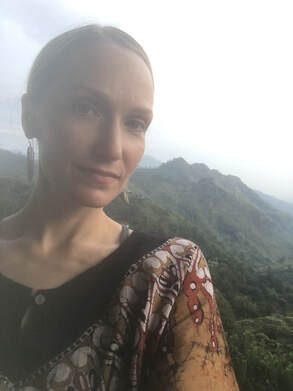
I recently read about Visual Snow (VS and VSS) and immediately identified with many of the symptoms that I have recognized since I was a kid. Yet, I have never met anyone personally that understands exactly how I see.
The symptoms for me consist of the persistent flashing of a static-like screen of circular, light reddish or sometimes clear rings with a black dot in the center, yet I can see shapes and colors of objects seemingly clearly. WHen I close my eyes the rings are bright red, black center dots flashing. There also sometimes is a moire-type pattern of a tone on tone shadowy cloudlike movement. For example, it almost looks like air passing from the left and from the right that bypasses one another. Yet the direction of the movement is not limited to left and right. It's like witnessing clouds or smoke moving from various opposing directions but it's very subtle. Yet there is always that separate cloudlike movement screen that is layered behind the flashing rings. There are some more visual descriptions but attempting to keep this as short as possible.
The symptoms mostly don't bother me but I am sometimes bothered by my eyes themselves. In the past, I worked in the photo industry and the strobe lights always bothered me. I have a very quick reflex to flash photography and it's hard to capture me with my eyes open with a flash. It is very hard for me to find the right prescription for my eyeglasses and am often unsatisfied.
When I was very young I would ask my mom about them and she would just say that maybe other people don't see them because they're not looking closely enough. I've discussed this a number of times over the years to various people at parties, with friends and family and it would just be something they would laugh with me about. I just chalked it up to being convinced that we all just see and sense things a little bit differently. Twenty years ago I tried looking it up online and found a little chat group on red dot syndrome which was a chat group of theories about people talking about it. So I knew only then that there are other people out there but didn't know until today that it was a recognized neurological syndrome that's being studied.
I'm happy to contribute to any future studies because I am certainly curious how people see uniquely on a spectrum. A 23 & Me genetic test allerted to me a while back that I have precursors for Macular Degeneration and my grandmother had it in her later years.
Brynne Rinderknecht
44 years old
The symptoms for me consist of the persistent flashing of a static-like screen of circular, light reddish or sometimes clear rings with a black dot in the center, yet I can see shapes and colors of objects seemingly clearly. WHen I close my eyes the rings are bright red, black center dots flashing. There also sometimes is a moire-type pattern of a tone on tone shadowy cloudlike movement. For example, it almost looks like air passing from the left and from the right that bypasses one another. Yet the direction of the movement is not limited to left and right. It's like witnessing clouds or smoke moving from various opposing directions but it's very subtle. Yet there is always that separate cloudlike movement screen that is layered behind the flashing rings. There are some more visual descriptions but attempting to keep this as short as possible.
The symptoms mostly don't bother me but I am sometimes bothered by my eyes themselves. In the past, I worked in the photo industry and the strobe lights always bothered me. I have a very quick reflex to flash photography and it's hard to capture me with my eyes open with a flash. It is very hard for me to find the right prescription for my eyeglasses and am often unsatisfied.
When I was very young I would ask my mom about them and she would just say that maybe other people don't see them because they're not looking closely enough. I've discussed this a number of times over the years to various people at parties, with friends and family and it would just be something they would laugh with me about. I just chalked it up to being convinced that we all just see and sense things a little bit differently. Twenty years ago I tried looking it up online and found a little chat group on red dot syndrome which was a chat group of theories about people talking about it. So I knew only then that there are other people out there but didn't know until today that it was a recognized neurological syndrome that's being studied.
I'm happy to contribute to any future studies because I am certainly curious how people see uniquely on a spectrum. A 23 & Me genetic test allerted to me a while back that I have precursors for Macular Degeneration and my grandmother had it in her later years.
Brynne Rinderknecht
44 years old
Meet Sandun
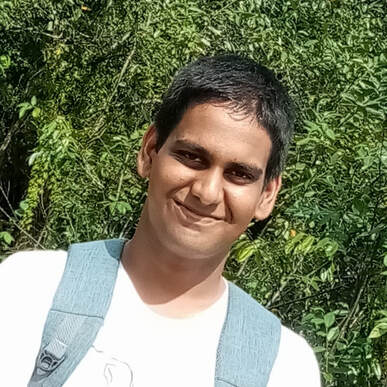
I was born in 2002 & I can barely remember seeing some sort of TV Static appearing for 4-5 seconds, Then it disappears during my Childhood & I had Tinnitus since Childhood.
In 2017 I had very small floaters & it didn't bother me very much. In 2020 I started using my Phone & PC more frequently because of COVID & it caused me to feel Pain in the Eyes.
Also since 2019 I started studying a Subject Stream which I which I don't like very much for my Advanced Level Exam as the Subject Stream I wanted to study wasn't available in my school. I faced the Exam in February of 2022, This was the Main Reason which brought me a Huge Stress.
As a hobby I did Digital Drawing, Video Editing & Animation, In August of 2022 I did my first professional animation to check for a foreign client. Unfortunately I got all Symptoms of VSS & Vitreous Detachments in both eyes after working on this project as I worked about 10-12 hours per day in front of the Computer Screen during a Whole Month, Even my Country Sri Lanka is on an Economical Crisis & that's why I wanted money to help my family, Now I can't even do a Single Artwork using Phone or PC, I never thought my passion for Drawing & Animation would become a Huge Problem in my Life.
In September of 2022 I got lower results from the Advanced Level Exam which aren't enough to get a job. This made my VSS worse. Everyone thinks I only have Eye problems & I am tired of explaining my Symptoms to my Family, my friends & Doctors. There isn't anyone who knows about VSS in my country
• How I manage my Symptoms
° During the First 3 Months of VSS Insomnia bothered me a lot. I couldn't sleep because of Tinnitus, Self Lightning of the Eyes & The Sensitivity for Sounds & Lights. But by the Time I got adapted a little to Tinnitus & Self Lightning of the Eyes. I covered the Light bulb in the room but didn't make the room completely dark. And I removed the Clock from my Room as I used to count hours while not sleeping.
It would be awesome if we can build an App which would work on a VR Box to represent the Symptoms in a Virtual World. Then it would be helpful to Doctors & People to understand this Syndrome much more accurately.
I think in the Future someone will find a cure for VSS or At least a Brain Scan for to prove VSS. I am not giving up hope on that.
In 2017 I had very small floaters & it didn't bother me very much. In 2020 I started using my Phone & PC more frequently because of COVID & it caused me to feel Pain in the Eyes.
Also since 2019 I started studying a Subject Stream which I which I don't like very much for my Advanced Level Exam as the Subject Stream I wanted to study wasn't available in my school. I faced the Exam in February of 2022, This was the Main Reason which brought me a Huge Stress.
As a hobby I did Digital Drawing, Video Editing & Animation, In August of 2022 I did my first professional animation to check for a foreign client. Unfortunately I got all Symptoms of VSS & Vitreous Detachments in both eyes after working on this project as I worked about 10-12 hours per day in front of the Computer Screen during a Whole Month, Even my Country Sri Lanka is on an Economical Crisis & that's why I wanted money to help my family, Now I can't even do a Single Artwork using Phone or PC, I never thought my passion for Drawing & Animation would become a Huge Problem in my Life.
In September of 2022 I got lower results from the Advanced Level Exam which aren't enough to get a job. This made my VSS worse. Everyone thinks I only have Eye problems & I am tired of explaining my Symptoms to my Family, my friends & Doctors. There isn't anyone who knows about VSS in my country
• How I manage my Symptoms
° During the First 3 Months of VSS Insomnia bothered me a lot. I couldn't sleep because of Tinnitus, Self Lightning of the Eyes & The Sensitivity for Sounds & Lights. But by the Time I got adapted a little to Tinnitus & Self Lightning of the Eyes. I covered the Light bulb in the room but didn't make the room completely dark. And I removed the Clock from my Room as I used to count hours while not sleeping.
It would be awesome if we can build an App which would work on a VR Box to represent the Symptoms in a Virtual World. Then it would be helpful to Doctors & People to understand this Syndrome much more accurately.
I think in the Future someone will find a cure for VSS or At least a Brain Scan for to prove VSS. I am not giving up hope on that.
Meet Bethany
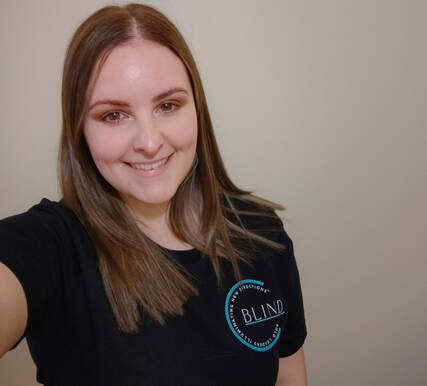
My name is Bethany. I am a writer of short stories and poetry, a disability advocate and lover of books living on Kaurna land in Adelaide, South Australia. I was around 13 or 15 years old when I first started noticing these odd visual distortions that seemed to come out of nowhere and to this day, have only increased in frequency. I describe them as flashing or shimmering lights, meaning my vision is never ‘still’, there’s always some form of movement. It seems to worsen on bright, sunny days, especially if I’m not wearing sunglasses. I also experience what I now know is called visual snow, which looks strikingly similar to old, analog TV static. It doesn’t hurt and it never goes away, not even when I close my eyes.
In 2018 I was diagnosed with an inherited retinal disease called Retinitis Pigmentosa. RP affects the light sensitive part of the eye, the retina, as the rods and cones begin to deteriorate. Night blindness is one of the first and most common symptoms, alongside peripheral vision loss, also called tunnel vision, light sensitivity and blind spots. It can also lead to other conditions like glaucoma and cataracts. There is no cure and the rate of vision loss varies greatly from person to person, as well as what gene you have. There are over 150 genes which cause it.
My gene is called USH2A. I recently received the results of my genetic testing, which revealed that I have non-syndromic Usher’s Syndrome. Usher’s is another rare disease which causes Retinitis Pigmentosa and hearing loss. My genetic counselor suspects that I have RP type 39 which is associated with non-syndromic Usher’s Syndrome, because I haven’t yet been affected by any hearing loss and it’s unlikely that I will be.
Visual snow is so hard to accurately describe and it looks different for everyone who is affected by it, just like how blindness is a spectrum. There is a sliding scale that we’re all on when it comes to our vision and everyone’s experience is valid. My visual snow interferes with how I watch TV and movies, how I see faces, objects and scenery, how I perceive the world around me. My vision is always agitated, it’s never calm or settled, it’s always moving and I try my best to ignore it and look past it but it isn’t always easy! I am very lucky that a very, very small area of my central vision is unaffected. It’s bizarre nowadays to think that when I was a young child, before I experienced any night blindness or visual snow, that my vision was considered ‘normal’.
What I wish people knew is that there is no right or wrong way to ‘look’ or ‘act’ blind or visually impaired. We love fashion and makeup and adventure and excitement just as much as everyone else and we are unique individuals, not a monolith.
In 2018 I was diagnosed with an inherited retinal disease called Retinitis Pigmentosa. RP affects the light sensitive part of the eye, the retina, as the rods and cones begin to deteriorate. Night blindness is one of the first and most common symptoms, alongside peripheral vision loss, also called tunnel vision, light sensitivity and blind spots. It can also lead to other conditions like glaucoma and cataracts. There is no cure and the rate of vision loss varies greatly from person to person, as well as what gene you have. There are over 150 genes which cause it.
My gene is called USH2A. I recently received the results of my genetic testing, which revealed that I have non-syndromic Usher’s Syndrome. Usher’s is another rare disease which causes Retinitis Pigmentosa and hearing loss. My genetic counselor suspects that I have RP type 39 which is associated with non-syndromic Usher’s Syndrome, because I haven’t yet been affected by any hearing loss and it’s unlikely that I will be.
Visual snow is so hard to accurately describe and it looks different for everyone who is affected by it, just like how blindness is a spectrum. There is a sliding scale that we’re all on when it comes to our vision and everyone’s experience is valid. My visual snow interferes with how I watch TV and movies, how I see faces, objects and scenery, how I perceive the world around me. My vision is always agitated, it’s never calm or settled, it’s always moving and I try my best to ignore it and look past it but it isn’t always easy! I am very lucky that a very, very small area of my central vision is unaffected. It’s bizarre nowadays to think that when I was a young child, before I experienced any night blindness or visual snow, that my vision was considered ‘normal’.
What I wish people knew is that there is no right or wrong way to ‘look’ or ‘act’ blind or visually impaired. We love fashion and makeup and adventure and excitement just as much as everyone else and we are unique individuals, not a monolith.
Meet Ruby
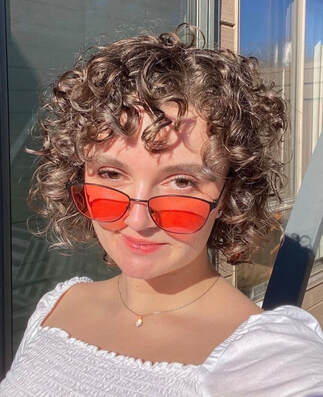
My name is Ruby and I’m a professional makeup artist and content creator from Vancouver BC. I have diagnosed VSS as well as ankylosing spondylitis. I can’t remember exactly when my VSS symptoms began but once I realized that what I was seeing wasn’t normal, and it also started to get worse and affect my daily life more, I decided to find out what was wrong.
As I have ankylosing spondylitis as well as visual snow syndrome, I deal with various different symptoms of chronic illness. I experience layers of visual disturbance due to the VSS (static, waves/ripples, as well as floaters and white spots) in my entire visual field at all times of the day. I also experience tinnitus and chronic headaches and migraines because of this. Alongside the VSS and my autoimmune disease, I have had to find ways to lessen the effects of these symptoms in my daily life.
My goal is to raise awareness about disabilities such as visual snow syndrome on my social media platforms. I am passionate about advocating for those who struggle with adversities from these disabilities in their careers, as well as showing that you can gain success by embracing who you are.
As I have ankylosing spondylitis as well as visual snow syndrome, I deal with various different symptoms of chronic illness. I experience layers of visual disturbance due to the VSS (static, waves/ripples, as well as floaters and white spots) in my entire visual field at all times of the day. I also experience tinnitus and chronic headaches and migraines because of this. Alongside the VSS and my autoimmune disease, I have had to find ways to lessen the effects of these symptoms in my daily life.
My goal is to raise awareness about disabilities such as visual snow syndrome on my social media platforms. I am passionate about advocating for those who struggle with adversities from these disabilities in their careers, as well as showing that you can gain success by embracing who you are.
Meet Debra
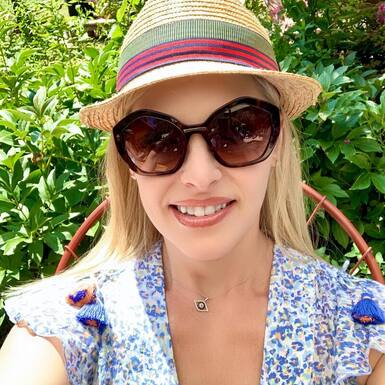
My story might be an older one as I never knew what I had until about 17 years ago when a neighbor who is an eye surgeon casually diagnosed me. I never spoke of my disease since childhood except to very close friends. What was the point? Usually, I got side eyes and baffled expressions. It confused me as well.
At five years old I remember sitting in bed watching the primary dots shake and vibrate in my whole visual field, I remember watching them line up into squares- which they still do. Reading black and white letters on paper was difficult, so I decided a way to overcome it by putting a solid sheet under each line- which I still do.
Countless trips to eye doctors as a child- my eyes are normal- told I was making it up or was psychological. I knew in my heart it wasn’t. However, I tired of explaining it. I was worried- would I go blind? Would my children squire this disorder? It kept me from having children for a long time. But it did not hold me back. Despite the disassociation that comes from this, I had a career for 30 years as a graphic artist. I was great at it too- and was in computer aided design. I graduated from college and pressed on with life.
The snow has progressed with age. It makes me weary at times and gives insomnia. But now I know its name and that it is neurological. I wish I knew more. The migraines are tough as well as the after images- it feels almost like you are on an acid kind trip without the drugs. But I am lucky in a sense I was born with it because I know no other way. I won’t know complete darkness or see a bright blue sky in filtered or a plain white wall. But I take peace in knowing there are others and research is being done.
For my son’s coming of age birthday, I started a Facebook go fund me to earn money toward research. My son has told me he has it- but I think it is a milder case. I don’t know for sure. One thing I know, you can overcome anything if you power through it and concentrate on what you can do.
At five years old I remember sitting in bed watching the primary dots shake and vibrate in my whole visual field, I remember watching them line up into squares- which they still do. Reading black and white letters on paper was difficult, so I decided a way to overcome it by putting a solid sheet under each line- which I still do.
Countless trips to eye doctors as a child- my eyes are normal- told I was making it up or was psychological. I knew in my heart it wasn’t. However, I tired of explaining it. I was worried- would I go blind? Would my children squire this disorder? It kept me from having children for a long time. But it did not hold me back. Despite the disassociation that comes from this, I had a career for 30 years as a graphic artist. I was great at it too- and was in computer aided design. I graduated from college and pressed on with life.
The snow has progressed with age. It makes me weary at times and gives insomnia. But now I know its name and that it is neurological. I wish I knew more. The migraines are tough as well as the after images- it feels almost like you are on an acid kind trip without the drugs. But I am lucky in a sense I was born with it because I know no other way. I won’t know complete darkness or see a bright blue sky in filtered or a plain white wall. But I take peace in knowing there are others and research is being done.
For my son’s coming of age birthday, I started a Facebook go fund me to earn money toward research. My son has told me he has it- but I think it is a milder case. I don’t know for sure. One thing I know, you can overcome anything if you power through it and concentrate on what you can do.
Meet Paris
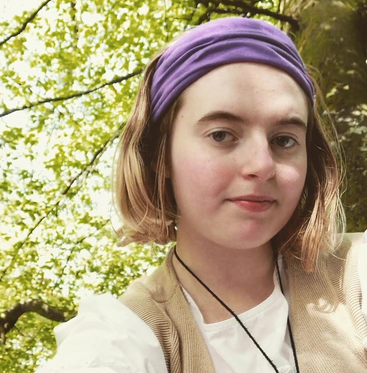
I'm Paris and I am from Scotland. I have always seen a layer of dot's over my entire field of vision, and I assumed this was the way everybody saw. When I found out that others did not see this, I still just put it down to the fact I'm neurodivergent, so my brain processes the world differently. It wasn't until a year ago that I came across the term 'Visual Snow Syndrome' and everything began to make sense. The effects of VSS affect me daily and in the past caused me great anxiety as I would experience blurred vision, ghosting, afterimages, flashing, floaters, night blindness etc. and at points I was convinced that I was going blind.
I also suffer from depersonalization, tinnitus, chronic vertigo and abnormal nerve numbness, burns and pain down the entire left-hand side of my body, which can be very anxiety provoking.
Finding out the reason I experience these symptoms has really helped and I am now in the process of trying to get a diagnosis which is proving difficult. I was referred by my doctor to an ophthalmologist who refused to listen to me and so the next step will probably have to be a neurologist or opto- neurologist, and it is really stressing me out because of my social anxiety, but hopefully it will be worth it in the end.
I try my best to raise awareness about the condition as it's rare to come across a professional who has heard of visual snow.
I also suffer from depersonalization, tinnitus, chronic vertigo and abnormal nerve numbness, burns and pain down the entire left-hand side of my body, which can be very anxiety provoking.
Finding out the reason I experience these symptoms has really helped and I am now in the process of trying to get a diagnosis which is proving difficult. I was referred by my doctor to an ophthalmologist who refused to listen to me and so the next step will probably have to be a neurologist or opto- neurologist, and it is really stressing me out because of my social anxiety, but hopefully it will be worth it in the end.
I try my best to raise awareness about the condition as it's rare to come across a professional who has heard of visual snow.
Meet Jen
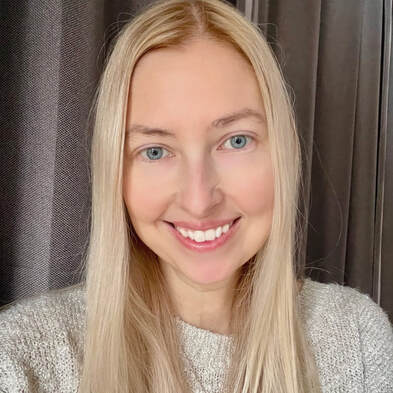
Hi. My name is Jennifer Ambrose, you can call me Jen. I am the founder of the Eye on Vision Foundation Corp (EOVF) non-profit, tax-deductible 501(c)3 organization. Like so many charities which are close to our heart, EOVF was started for personal reasons. I'd like to just take a few moments of your time and tell you about my personal story with Visual Snow Syndrome and let you know a little more about what EOVF is all about.
In the summer of 2005 I woke up to a world which had been changed forever in my eyes. I saw floating spots and clouds everywhere. I had experienced floaters in bright sun before and guessed that this was some type of extreme case. Instantly I got very nervous knowing that I had once asked my doctor about them and knew that there was no treatment. Nevertheless I made an appointment with my eye doctor. I was told that I had no retinal tears, and that my eyes looked healthy aside from the floaters.
I went home in despair, as I was given no hope that these would be going away. I would have to live with them the rest of my life. Also, I may have a potentially blinding condition in macular degeneration.
Days past, and I started seeing visual snow everywhere. I had always seen static in the dark since childhood (which I thought was normal at the time), but never with the lights on. Every wall I looked at was covered in static. I covered one eye static, I covered another eye static. I went to a neuro-opthamologist this time, and all of my tests came back normal. He said he wasn't familiar with my symptoms and had no advice.
Days past, and my eyes became very sensitive to light. I started seeing negative after images everywhere, then my body began to tingle. I called the doctor and he said I needed to get to the ER, that I may be having a stroke. At the time I was 27 years old, so a stroke seemed a bit rare, but so was everything else happening to me. I was admitted into the hospital for a week and had every test run known to man including CT scans, MRIs, blood work, X Rays, and a lumbar puncture.
When I came home from the hospital my vision was worse. I was having ghosting images, halos, glare, and my vision had gone from about 20/30 to 20/40. Still no explanations.
A few weeks went by and I was looking at my baby daughter; my older daughter was right behind her and there were two of her. I was seeing double. Not on the object I directly looked at, but whatever behind my object of focus was doubled. Back to yet another doctor. I was told that my brain had stopped filtering out excess visual information. Each eye sees two independent images and it is our brain that fuses those images into one. My brain was not doing that job effectively anymore.
Down to Bascom Palmer in Miami for extensive testing. All results normal. Back to Orlando for a $500 an hour, out-of-pocket, neurologist. All results normal.
Finally, after months I stopped getting new symptoms, but every single symptom I developed over those months has stayed with me. I still have the floaters, visual snow, after images, ghosting, glare, haloes, double vision. I still live with it all 24 hours a day, 7 days a week. Even with my eyes shut tight.
Eventually I found a message board with hundreds of other people suffering from the same condition all around the world. All of their tests came back normal as well.
Fast forward to 2010, a patient that I had met through one of the online message boards for VSS connected me to Prof. Peter Goadsby. We formed a collaboration, along with Dr. Christoph Schankin, on the first ever Visual Snow Syndrome research study. The article was published on March 18th 2014 and is entitled ‘Visual snow’ – a disorder distinct from persistent migraine aura. This ground-breaking study gave VSS sufferers a formal diagnosis for the first time, and led the NIH to formally recognize Visual Snow Syndrome as a rare disease: Rare Disease Status .
In June 2014 - some of my symptoms which had calmed down over the years came back even worse than 2005. I had never lost any of the symptoms, but they had lessened to the point that I was able to lead a happy life. All of my symptoms came back full force and new symptoms of flashes, blue random circles, and vertigo developed.
In 2016, yet another worsening of symptoms occurred. This left me housebound and often times wondering if there would ever be a calm down of symptoms again. They calmed, but never got back to any of my previous levels, and I learned to adjust. The worsenings have become almost annually at this point. In 2021 I caught to Covid virus which landed me in the hospital for a week. My VSS symptoms worsened from the virus. I now have long haul Covid symptoms, silent migraine symptom, as well as my Visual Snow Syndrome symptoms.
This is a very personal cause to me. This is why I created the Eye on Vision Foundation. When I first developed the condition nothing was known about it and no research was being conducted and no doctor even wanted to believe patients. We have come a long way in 16 years, but we are still lacking something that I feel is crucial to our quality of lives - a treatment. I share my personal story with you all, so that you know how invested I am in finding a treatment and a cure for Visual Snow Syndrome. I live with this condition day in and day out. I'm not giving up and welcome others to commit to finding a cure along side me! Please feel free to reach out to me at [email protected]
In the summer of 2005 I woke up to a world which had been changed forever in my eyes. I saw floating spots and clouds everywhere. I had experienced floaters in bright sun before and guessed that this was some type of extreme case. Instantly I got very nervous knowing that I had once asked my doctor about them and knew that there was no treatment. Nevertheless I made an appointment with my eye doctor. I was told that I had no retinal tears, and that my eyes looked healthy aside from the floaters.
I went home in despair, as I was given no hope that these would be going away. I would have to live with them the rest of my life. Also, I may have a potentially blinding condition in macular degeneration.
Days past, and I started seeing visual snow everywhere. I had always seen static in the dark since childhood (which I thought was normal at the time), but never with the lights on. Every wall I looked at was covered in static. I covered one eye static, I covered another eye static. I went to a neuro-opthamologist this time, and all of my tests came back normal. He said he wasn't familiar with my symptoms and had no advice.
Days past, and my eyes became very sensitive to light. I started seeing negative after images everywhere, then my body began to tingle. I called the doctor and he said I needed to get to the ER, that I may be having a stroke. At the time I was 27 years old, so a stroke seemed a bit rare, but so was everything else happening to me. I was admitted into the hospital for a week and had every test run known to man including CT scans, MRIs, blood work, X Rays, and a lumbar puncture.
When I came home from the hospital my vision was worse. I was having ghosting images, halos, glare, and my vision had gone from about 20/30 to 20/40. Still no explanations.
A few weeks went by and I was looking at my baby daughter; my older daughter was right behind her and there were two of her. I was seeing double. Not on the object I directly looked at, but whatever behind my object of focus was doubled. Back to yet another doctor. I was told that my brain had stopped filtering out excess visual information. Each eye sees two independent images and it is our brain that fuses those images into one. My brain was not doing that job effectively anymore.
Down to Bascom Palmer in Miami for extensive testing. All results normal. Back to Orlando for a $500 an hour, out-of-pocket, neurologist. All results normal.
Finally, after months I stopped getting new symptoms, but every single symptom I developed over those months has stayed with me. I still have the floaters, visual snow, after images, ghosting, glare, haloes, double vision. I still live with it all 24 hours a day, 7 days a week. Even with my eyes shut tight.
Eventually I found a message board with hundreds of other people suffering from the same condition all around the world. All of their tests came back normal as well.
Fast forward to 2010, a patient that I had met through one of the online message boards for VSS connected me to Prof. Peter Goadsby. We formed a collaboration, along with Dr. Christoph Schankin, on the first ever Visual Snow Syndrome research study. The article was published on March 18th 2014 and is entitled ‘Visual snow’ – a disorder distinct from persistent migraine aura. This ground-breaking study gave VSS sufferers a formal diagnosis for the first time, and led the NIH to formally recognize Visual Snow Syndrome as a rare disease: Rare Disease Status .
In June 2014 - some of my symptoms which had calmed down over the years came back even worse than 2005. I had never lost any of the symptoms, but they had lessened to the point that I was able to lead a happy life. All of my symptoms came back full force and new symptoms of flashes, blue random circles, and vertigo developed.
In 2016, yet another worsening of symptoms occurred. This left me housebound and often times wondering if there would ever be a calm down of symptoms again. They calmed, but never got back to any of my previous levels, and I learned to adjust. The worsenings have become almost annually at this point. In 2021 I caught to Covid virus which landed me in the hospital for a week. My VSS symptoms worsened from the virus. I now have long haul Covid symptoms, silent migraine symptom, as well as my Visual Snow Syndrome symptoms.
This is a very personal cause to me. This is why I created the Eye on Vision Foundation. When I first developed the condition nothing was known about it and no research was being conducted and no doctor even wanted to believe patients. We have come a long way in 16 years, but we are still lacking something that I feel is crucial to our quality of lives - a treatment. I share my personal story with you all, so that you know how invested I am in finding a treatment and a cure for Visual Snow Syndrome. I live with this condition day in and day out. I'm not giving up and welcome others to commit to finding a cure along side me! Please feel free to reach out to me at [email protected]
Meet Krystal
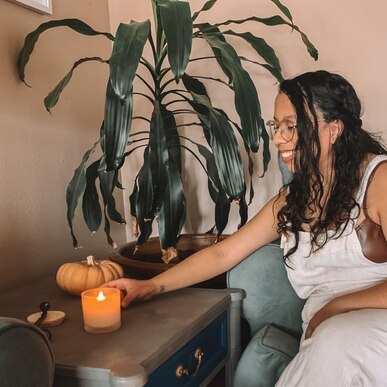
My name is Krystal! I developed VSS in January 2016. I had my first migraine aura that looked like fireflies moving across my vision. After that, I had an onset of static. I questioned whether I had the static prior and tried to ignore it for a few days. I then realized that my vision was not normal. I saw a neurologist who validated my symptoms and referred me to a neuro-ophthalmologist. I was dismissed by my ophthalmologist and wasn’t able to receive care through him. Fortunately, I received my VSS diagnosis through the neuro-ophthalmologist. I’ve tried medication, but it didn’t work. VSS affects my daily life and can be discouraging. I struggle with static, floaters, tinnitus, and focusing on straight lines. Sometimes it’s difficult to cope because I don’t find relief in closing my eyes. I am hopeful that there will be a cure soon. I am grateful for the community EOVF has provided and all of the resources they provide.
Meet Kevin

My name is Kevin Marcaida. I’m a Neuroscientist at Imperial College London and Biotech Investor. My VSS story started in 2019 during a trip to New York City.
Before the onset, I had an 8-hour flight from London where I experienced jetlag and I subsequently couldn’t sleep for more than 3 hours at a time. I began to experience my symptoms gradually during a casual nature hike in Long Island.
When glancing up at the forest canopy, I saw flashes of bright colours followed by afterimages of the sun. At first, I didn’t think too much of this. However, after a few dysregulated nights of sleep the symptoms became more pronounced.
Near the end of the trip, I managed to get my first proper night’s rest. However, upon waking, the symptoms I experienced became permanent and was accompanied by white ‘static’ overlaying my visual field.
What I find frustrating about VSS is the lack of medical insight especially in the clinics. I had several consultations with General Practitioners, with each visit being turned away or receiving the typical ‘anxiety’ diagnosis.
Irritated by these experiences, I decided to investigate the symptoms myself. Given my background as a Biomedical Scientist, I quickly found several research journals and an entire community dedicated to VSS.
Whilst I wasn’t too pleased with the research findings. I was at least happy to know that there are other people who understand and are working hard to find solutions - eventually inspiring me to take an interest in Neuroscience.
At the end of the day, I do not let my disorder define who I am and what I can accomplish. However, I acknowledge that it’s part of me forever - and that’s perfectly fine. I always believe that it’s best to see both the good and the bad in experiences, no matter the situation. It’s ultimately just a matter of perception.
Before the onset, I had an 8-hour flight from London where I experienced jetlag and I subsequently couldn’t sleep for more than 3 hours at a time. I began to experience my symptoms gradually during a casual nature hike in Long Island.
When glancing up at the forest canopy, I saw flashes of bright colours followed by afterimages of the sun. At first, I didn’t think too much of this. However, after a few dysregulated nights of sleep the symptoms became more pronounced.
Near the end of the trip, I managed to get my first proper night’s rest. However, upon waking, the symptoms I experienced became permanent and was accompanied by white ‘static’ overlaying my visual field.
What I find frustrating about VSS is the lack of medical insight especially in the clinics. I had several consultations with General Practitioners, with each visit being turned away or receiving the typical ‘anxiety’ diagnosis.
Irritated by these experiences, I decided to investigate the symptoms myself. Given my background as a Biomedical Scientist, I quickly found several research journals and an entire community dedicated to VSS.
Whilst I wasn’t too pleased with the research findings. I was at least happy to know that there are other people who understand and are working hard to find solutions - eventually inspiring me to take an interest in Neuroscience.
At the end of the day, I do not let my disorder define who I am and what I can accomplish. However, I acknowledge that it’s part of me forever - and that’s perfectly fine. I always believe that it’s best to see both the good and the bad in experiences, no matter the situation. It’s ultimately just a matter of perception.
Meet Anna
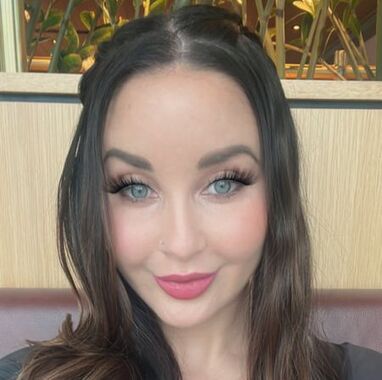
My name is Anna, and I am a 37-year-old mother of 3 who works in the mental health arena. I can’t pinpoint exactly when my visual snow and tinnitus began but I was in my late teens early 20’s, so I have been living with the condition well over 15 years. When I was younger, I would go to my GP and ask to be tested for schizophrenia. I never confessed to the doctor that I was seeing static and hearing high pitched ringing/ buzzing like cicadas. So, for years I lived silently convinced that I was going or had gone mad. I made it through the years with anti-anxiety medications like Xanax and Valium. One magical day about 5 years ago I was googling static vision and came across information and the name for my condition “visual snow syndrome or aeropsia”.
Armed with this new information I went to see a neurologist who had never heard of VSS and looked at me like I was crazy, which was of course extremely disheartening. I’ve also seen a psychiatrist who again had never heard of VSS but this time I implored her to please educate herself on the condition. If I was going to be her patient, than I wanted her to be across this condition. She now has a better understanding of this rare syndrome and that makes our interactions more beneficial.
Living with chronic visual snow and tinnitus is taxing. The only way I manage is by ignoring it to the best of my ability. Sometimes anti-anxiety medication is needed when I’m having a particularly hard day. If I focus too much on it, it only escalates my anxiety and depression and exacerbates my symptoms.
I try to find things that bring me joy, like craft and volunteering and try to stay positive. I am an amateur astronomer so it is my greatest wish that eventually I will be able to see the stars and the night sky without obstruction from my VSS. I hope clinicians learn more about this rare condition and efforts are made to develop treatments. No one should be made to feel crazy because of an uneducated health professional. I think raising awareness is imperative to improving the experience of people suffering with VSS. I’m so grateful now to have more information about my condition and to know that I am not alone.
Armed with this new information I went to see a neurologist who had never heard of VSS and looked at me like I was crazy, which was of course extremely disheartening. I’ve also seen a psychiatrist who again had never heard of VSS but this time I implored her to please educate herself on the condition. If I was going to be her patient, than I wanted her to be across this condition. She now has a better understanding of this rare syndrome and that makes our interactions more beneficial.
Living with chronic visual snow and tinnitus is taxing. The only way I manage is by ignoring it to the best of my ability. Sometimes anti-anxiety medication is needed when I’m having a particularly hard day. If I focus too much on it, it only escalates my anxiety and depression and exacerbates my symptoms.
I try to find things that bring me joy, like craft and volunteering and try to stay positive. I am an amateur astronomer so it is my greatest wish that eventually I will be able to see the stars and the night sky without obstruction from my VSS. I hope clinicians learn more about this rare condition and efforts are made to develop treatments. No one should be made to feel crazy because of an uneducated health professional. I think raising awareness is imperative to improving the experience of people suffering with VSS. I’m so grateful now to have more information about my condition and to know that I am not alone.
Meet Danielle
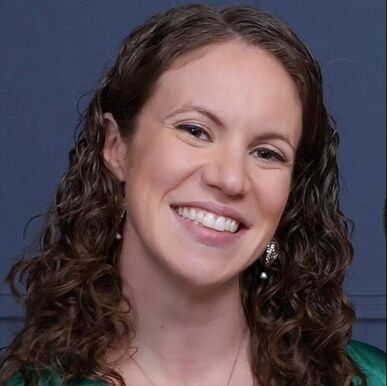
I don’t remember a time in my life without Visual Snow Syndrome (VSS). In fact, I thought everyone saw these flashing lights and colorful shapes! When I was around 7 years old, I somehow got it in my head that these dots I saw were a result of not getting enough sleep. I remember sleeping extra long hours in my mother’s waterbed, and yet, I would still wake up seeing the dots. I finally told my mother about this, and she took me to an eye doctor near my home in Massachusetts. Unfortunately, this was circa 1994, and they eye doctor had NO idea what I was talking about! I was dismissed and continued to live my life as I had been, for I never knew my vision to be any different.
Around middle and high school, I noticed how VSS started to impact my life. If I went to the movie theaters with friends and had to get up to use the restroom in the middle of film, finding my friends afterwards was nearly impossible. Adjusting back to the dim lighting of the theater, which is the light condition where my VSS is the worst, was very difficult, and I adapted by only going with another person who I could closely follow back to my seat. By high school, hanging out at twilight was scary, and I would take the same tactic, holding onto my friends’ shoulders to guide me. At this time, I still didn’t realize the impact of my symptoms, and chalked it up to “poor night vision.”
Fast forward to 2011, when I decided to have LASIK surgery done to correct my nearsightedness. I was in my first job post-college, and I was so excited to have a Flexible Spending Account and a decent health insurance plan! I ended up needing to have a version of LASIK, called PRK, which is used when the patient’s retina is too thin for LASIK. The recovery process was much more painful than with LASIK, but I was so happy with my 20/10 vision and no more glasses! That is, until I realized that the surgery also made my VSS clearer….
At this point, I was reinvigorated to figure out what was going on with my eyes. I had always described what I saw as the static that used to show over old television screens, in front of my vision at all times. The static was always worse in dim/twilight conditions, or when looking a large blank surface, like a blank wall or the sky. The static still exists on people and things, but it’s easier to ignore when there is more to look at. I went to various eye specialists in Boston, even those at prestigious hospitals, and had every test under the sun done. None of the doctors could tell me what was going on.
I am lucky, as I do not get many of the accompanying symptoms others experience. I don’t get migraines or tinnitus. I do have floaters, sensitivity to light, difficulty seeing at night, and palinopsia (I really hate having a picture taken with a bright flash, because I will see the flash right in the middle of my vision for minutes afterwards!)
I decided to take matters into my own hands, and thanks to the advancements of the internet since the 1990’s, I was able to find that the ‘static’ I’d seen in front of my eyes all my life was actually called VSS. I found a Facebook support group and was astounded to learn there were so many others like me! I made some virtual friends in that group that I am still friends with on social media 10 years later. I will never forget how one member, Thomas, told me he fell in the movie theatre because he couldn’t see. I had found my people!
Today, I talk freely about my VSS. People are always shocked and interested to learn about what I see. I am flattered when people remember, and will ask, what does this look like for you? I spent a few years following LASIK, worrying that it would continue to get worse and worse until I could no longer see at all. In reality, I think it is exactly the same it has always been. Although the LASIK brought it into clearer focus (literally and figuratively), it did also prompt me to look again for an answer to what I see every day. Sometimes, I imagine what my vision would be like without the VSS, but it’s difficult, as I don’t remember ever seeing without it. I have learned to live with my VSS, although it’s something I think about constantly! I am encouraged by the work Eye on Vision is doing!
Around middle and high school, I noticed how VSS started to impact my life. If I went to the movie theaters with friends and had to get up to use the restroom in the middle of film, finding my friends afterwards was nearly impossible. Adjusting back to the dim lighting of the theater, which is the light condition where my VSS is the worst, was very difficult, and I adapted by only going with another person who I could closely follow back to my seat. By high school, hanging out at twilight was scary, and I would take the same tactic, holding onto my friends’ shoulders to guide me. At this time, I still didn’t realize the impact of my symptoms, and chalked it up to “poor night vision.”
Fast forward to 2011, when I decided to have LASIK surgery done to correct my nearsightedness. I was in my first job post-college, and I was so excited to have a Flexible Spending Account and a decent health insurance plan! I ended up needing to have a version of LASIK, called PRK, which is used when the patient’s retina is too thin for LASIK. The recovery process was much more painful than with LASIK, but I was so happy with my 20/10 vision and no more glasses! That is, until I realized that the surgery also made my VSS clearer….
At this point, I was reinvigorated to figure out what was going on with my eyes. I had always described what I saw as the static that used to show over old television screens, in front of my vision at all times. The static was always worse in dim/twilight conditions, or when looking a large blank surface, like a blank wall or the sky. The static still exists on people and things, but it’s easier to ignore when there is more to look at. I went to various eye specialists in Boston, even those at prestigious hospitals, and had every test under the sun done. None of the doctors could tell me what was going on.
I am lucky, as I do not get many of the accompanying symptoms others experience. I don’t get migraines or tinnitus. I do have floaters, sensitivity to light, difficulty seeing at night, and palinopsia (I really hate having a picture taken with a bright flash, because I will see the flash right in the middle of my vision for minutes afterwards!)
I decided to take matters into my own hands, and thanks to the advancements of the internet since the 1990’s, I was able to find that the ‘static’ I’d seen in front of my eyes all my life was actually called VSS. I found a Facebook support group and was astounded to learn there were so many others like me! I made some virtual friends in that group that I am still friends with on social media 10 years later. I will never forget how one member, Thomas, told me he fell in the movie theatre because he couldn’t see. I had found my people!
Today, I talk freely about my VSS. People are always shocked and interested to learn about what I see. I am flattered when people remember, and will ask, what does this look like for you? I spent a few years following LASIK, worrying that it would continue to get worse and worse until I could no longer see at all. In reality, I think it is exactly the same it has always been. Although the LASIK brought it into clearer focus (literally and figuratively), it did also prompt me to look again for an answer to what I see every day. Sometimes, I imagine what my vision would be like without the VSS, but it’s difficult, as I don’t remember ever seeing without it. I have learned to live with my VSS, although it’s something I think about constantly! I am encouraged by the work Eye on Vision is doing!
Meet Cindy
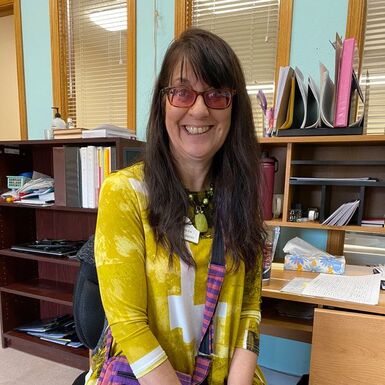
My name is Cindy Miller and I have had Visual Snow Syndrome for most of my life. In fact, I can’t seem to remember when it started. I have suspected that I had this syndrome many years ago as I have seen various posts on the symptoms. It seems recently that VSS has come to light and its about time. I have been to so many eye docs and doctors who have tried to treat the symptoms separately. I have not run across any specialist that is aware of VSS or even remotely interested in learning more about VSS.
I wear Irlen filtered glasses ( I am a certified screener) and the lenses have been a big coping mechanism for me to cope with life without chronic headaches. Otherwise the world, spins and swirls and reading is very difficult for me. I was not aware of the other various symptoms of VSS such as tinnitus, lack of night vision and depersonalization. and anxiety. I have always suffered from great anxiety and feel that my brain is on constant overload. Additionally, I am blind in my left eye and the VSS in my right eye makes everything much harder.
My hope is that someday I will be able to receive the right treatment for VSS and maybe encounter the chance to see things clearly. Thank you Eye On Vision for your research and awareness!
I wear Irlen filtered glasses ( I am a certified screener) and the lenses have been a big coping mechanism for me to cope with life without chronic headaches. Otherwise the world, spins and swirls and reading is very difficult for me. I was not aware of the other various symptoms of VSS such as tinnitus, lack of night vision and depersonalization. and anxiety. I have always suffered from great anxiety and feel that my brain is on constant overload. Additionally, I am blind in my left eye and the VSS in my right eye makes everything much harder.
My hope is that someday I will be able to receive the right treatment for VSS and maybe encounter the chance to see things clearly. Thank you Eye On Vision for your research and awareness!
Meet Stuart
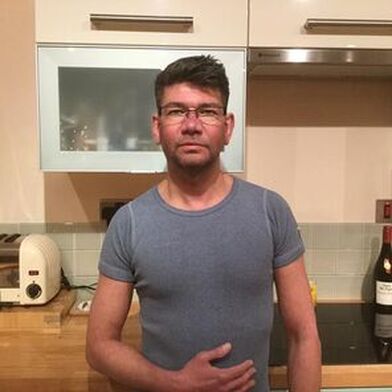
My name is Stuart Major, I am a UK citizen living in Cheshire.
I can remember at the age of 23 coming down with some kind of virus that laid me up for about a week. All my senses were affected by this which seemed normal at the time. When I got over this, everything returned to normal apart from my vision which still retained a grainy/static condition to
it. (This also included poor night-time vision).
I went to my GP and tried to explain what I was experiencing, but it was so hard to try and explain. They tried a number of things over a duration of months/years and in the end held their hands up and said “Sorry, we give up, we can’t think of anything else to try and we don’t know what it is you
have”.
After a while, I became accustomed to this experience (I couldn’t work as an Illustrator/Artist any
longer) and learned to live life normally with this, sometimes forgetting about it for days, I was
happy-ish again. This stayed constant not getting worse or better.
Many years later at the age of 48, I noticed that the static got worse, along with this I developed tinnitus, dizziness, floaters, after images, brain fog and constant pressure in my head. Not thinking this was related I went to the GP again who intern sent me to an Ophthalmologist/Neurologist who
couldn’t find anything wrong with me after many tests/scans.
By this time I was suffering from depression and was in a dark place as I now had a wife, a teenage son and a demanding job and was worried that I couldn’t keep on top of things!
Around this time I went for an annual standard eye examination at the optician which was normal. Then the Optician asked me if there was anything with my vision that I wanted to discuss. I just thought that I would mention the grainy vision that I had had for many years now. Their reply was “This sounds a bit like a new condition that the medical field have now acknowledged called Visual Snow”. I immediately went back to the office and ‘Googled’ this and ‘EUPHORIA’!!
I had finally found out what I was suffering from and that it was a condition with a name and there were others going through this (which was kind of comforting – not in a horrible way). I have managed to become a patient of a Neurologist who has written articles on VSS and am
currently being trialled on different treatments.
I am so happy to now see so many organisations out there globally now fighting our coarse and looking for funds to try and find a treatment/cure for VSS and great progress has been made with regards to the area of the brain the hyperactivity is coming from and I honestly think that we shall
get there soon!...........So please stay strong and let’s hope for a happy 2022!
I can remember at the age of 23 coming down with some kind of virus that laid me up for about a week. All my senses were affected by this which seemed normal at the time. When I got over this, everything returned to normal apart from my vision which still retained a grainy/static condition to
it. (This also included poor night-time vision).
I went to my GP and tried to explain what I was experiencing, but it was so hard to try and explain. They tried a number of things over a duration of months/years and in the end held their hands up and said “Sorry, we give up, we can’t think of anything else to try and we don’t know what it is you
have”.
After a while, I became accustomed to this experience (I couldn’t work as an Illustrator/Artist any
longer) and learned to live life normally with this, sometimes forgetting about it for days, I was
happy-ish again. This stayed constant not getting worse or better.
Many years later at the age of 48, I noticed that the static got worse, along with this I developed tinnitus, dizziness, floaters, after images, brain fog and constant pressure in my head. Not thinking this was related I went to the GP again who intern sent me to an Ophthalmologist/Neurologist who
couldn’t find anything wrong with me after many tests/scans.
By this time I was suffering from depression and was in a dark place as I now had a wife, a teenage son and a demanding job and was worried that I couldn’t keep on top of things!
Around this time I went for an annual standard eye examination at the optician which was normal. Then the Optician asked me if there was anything with my vision that I wanted to discuss. I just thought that I would mention the grainy vision that I had had for many years now. Their reply was “This sounds a bit like a new condition that the medical field have now acknowledged called Visual Snow”. I immediately went back to the office and ‘Googled’ this and ‘EUPHORIA’!!
I had finally found out what I was suffering from and that it was a condition with a name and there were others going through this (which was kind of comforting – not in a horrible way). I have managed to become a patient of a Neurologist who has written articles on VSS and am
currently being trialled on different treatments.
I am so happy to now see so many organisations out there globally now fighting our coarse and looking for funds to try and find a treatment/cure for VSS and great progress has been made with regards to the area of the brain the hyperactivity is coming from and I honestly think that we shall
get there soon!...........So please stay strong and let’s hope for a happy 2022!
Meet Matthew
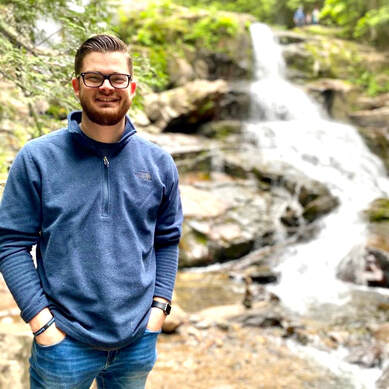
My name is Matthew and I suffer from visual snow syndrome (VSS). I work as a research scientist and am from New York! I have suffered from VSS since 2008 when I was 17/18 years old. Right around my 18th birthday I noticed a large dark floater in my left eye. I thought I was going blind or something very serious was going on. The floater slowly got bigger, darker, and longer until it stretched across my entire visual field in my left eye. Then, I noticed the ringing in my ears (tinnitus). Then the static/snow and Blue Field entoptic phenomenon set it and was noticeable against solid surface, in the dark, and against the sky. I slowly noticed my night vision worsening as well. Many folks believe they know what triggered their VSS. A certain medication they took, an illness they had, a drug they tried. I do not know for certain, but my best guess is that my symptoms started after a bad migraine with aura. I suffered with Migraines as a teenager and had one at least once every few months. I continue to suffer with migraines to this day.
When it all first started, I visited every type of doctor you can imagine. I saw a primary care provider, optometrist, neurologist, retina specialist, ophthalmologist and a neuro-ophthalmologist, etc. The list goes on. No one could tell me what was going on and no one at this point had really heard of VSS. Medical care providers accused me of having anxiety, making it up, doing drugs and lying about doing drugs. It was very disheartening to be treated in such a way when I was just looking for support and trying to figure out what was going on with my health at such a young age. I had numerous test performed including CT scans, MRIs, MRIs with contrast, and EKGs.
Fast forward 5-6 years to my senior year of college and I noticed some of my symptoms seemed to be worsening and there were some new ones. I now saw slight trails off of bright lights and surfaces, I saw after images when looking away from objects, my night vision continued to get worse, and I noticed it was very difficult to see in low light settings and my static was getting denser. At this point I started to do my own research again and I stumbled on a large community of folks that seemed to be experiencing similar symptoms and having similar issues getting a diagnosis. That is when I first learned the term “visual snow.” It was strangely comforting to finally be able to out a name to the condition and at least some sort of explanation as to why I had been experiencing these strange sensations and visual disturbances.
Thankfully I was referred to the Flaum Eye Institute in Rochester NY and was seen by a world-renowned Neuro-Ophthalmologist. I had every eye exam and test you can dream of and everything came back normal. After extensive examination the Dr. officially gave me my first diagnosis of visual snow syndrome. She said it was rare, nobody understood what caused it or how to treat it, but she assured me I would not go blind. It was amazing to not be dismissed by a medical professional and actually get a diagnosis. From there, I mostly learned to live with my condition. I finished college, worked in the private sector, went to graduate school. I have an amazing career, a wonderful girlfriend, supportive friends, family and pets I love very much.
My symptoms stayed relatively stable from that point forward until this Fall. I had two migraines after exercising within the same month and since then my symptoms have continued to worsen and deteriorate. My floaters have exploded and exponentially increased every day since, my static is much denser, my low light vision has gotten significantly worse, my night vision is worse, my tinnitus is louder, I have on and off headaches, I see afterimages more often and for longer periods of time, reading dense text in a book or on a screen is very difficult because the words shimmer, shake, and move around (this actually makes me nauseous), I have extreme light sensitivity (fluorescent lights are extremely difficult and can cause migraines), digital screens are very hard for me to look at (televisions, computers, smartphones, etc.) and I have to make extreme adjustments to use them on a daily basis for work and for pleasure. I am unable to watch tv or use computer or phones in the dark as the contrast really seems to set my symptoms off and it is too harsh for me to look at. I also now see orbs and arc of light throughout my visual field throughout the day (I believe these are pressure phosphenes) and they can be really strange and distracting. I have bouts of extreme fatigue, brain fog, confusion, forgetfulness, anxiety and depression. It is extremely hard living with a chronic illness, let alone one that is a mystery and has no treatment, cure, or official prognosis. Until the pathophysiology of the condition is understood I am stuck living with a very messy visual field.
I have made adjustments for now and am surviving. I have multiple pairs of glasses with different types of filters to help with certain lighting situation and so digital screens are not so harsh on my eyes and do not cause headaches. I have special filters applied to my work and personal computers. I require the brightness to be turned down and night mode to be turned on for all of my digital devices so I can read them without getting a headache and or nauseous. Reading books is also very difficult but I have found certain colored pages and the right bright, white, cool light make it manageable. I really enjoy reading books, so it has been really important to me that I am able to make adjustments to do so. Many of my hobbies were negatively affected by this condition but I am learning to make adjustments and enjoy them the best I can. Invisible chronic illness is extremely difficult for many people to understand and even difficult for the medical community to understand how negatively it effects my day-to-day life 24/7-365. I just hope with advancing technology and more awareness better days are on the horizon. I hope I live to see the day where folks in the VSS community are able to receive treatment that at least provides some form of relief. Thanks for listening to my story!
When it all first started, I visited every type of doctor you can imagine. I saw a primary care provider, optometrist, neurologist, retina specialist, ophthalmologist and a neuro-ophthalmologist, etc. The list goes on. No one could tell me what was going on and no one at this point had really heard of VSS. Medical care providers accused me of having anxiety, making it up, doing drugs and lying about doing drugs. It was very disheartening to be treated in such a way when I was just looking for support and trying to figure out what was going on with my health at such a young age. I had numerous test performed including CT scans, MRIs, MRIs with contrast, and EKGs.
Fast forward 5-6 years to my senior year of college and I noticed some of my symptoms seemed to be worsening and there were some new ones. I now saw slight trails off of bright lights and surfaces, I saw after images when looking away from objects, my night vision continued to get worse, and I noticed it was very difficult to see in low light settings and my static was getting denser. At this point I started to do my own research again and I stumbled on a large community of folks that seemed to be experiencing similar symptoms and having similar issues getting a diagnosis. That is when I first learned the term “visual snow.” It was strangely comforting to finally be able to out a name to the condition and at least some sort of explanation as to why I had been experiencing these strange sensations and visual disturbances.
Thankfully I was referred to the Flaum Eye Institute in Rochester NY and was seen by a world-renowned Neuro-Ophthalmologist. I had every eye exam and test you can dream of and everything came back normal. After extensive examination the Dr. officially gave me my first diagnosis of visual snow syndrome. She said it was rare, nobody understood what caused it or how to treat it, but she assured me I would not go blind. It was amazing to not be dismissed by a medical professional and actually get a diagnosis. From there, I mostly learned to live with my condition. I finished college, worked in the private sector, went to graduate school. I have an amazing career, a wonderful girlfriend, supportive friends, family and pets I love very much.
My symptoms stayed relatively stable from that point forward until this Fall. I had two migraines after exercising within the same month and since then my symptoms have continued to worsen and deteriorate. My floaters have exploded and exponentially increased every day since, my static is much denser, my low light vision has gotten significantly worse, my night vision is worse, my tinnitus is louder, I have on and off headaches, I see afterimages more often and for longer periods of time, reading dense text in a book or on a screen is very difficult because the words shimmer, shake, and move around (this actually makes me nauseous), I have extreme light sensitivity (fluorescent lights are extremely difficult and can cause migraines), digital screens are very hard for me to look at (televisions, computers, smartphones, etc.) and I have to make extreme adjustments to use them on a daily basis for work and for pleasure. I am unable to watch tv or use computer or phones in the dark as the contrast really seems to set my symptoms off and it is too harsh for me to look at. I also now see orbs and arc of light throughout my visual field throughout the day (I believe these are pressure phosphenes) and they can be really strange and distracting. I have bouts of extreme fatigue, brain fog, confusion, forgetfulness, anxiety and depression. It is extremely hard living with a chronic illness, let alone one that is a mystery and has no treatment, cure, or official prognosis. Until the pathophysiology of the condition is understood I am stuck living with a very messy visual field.
I have made adjustments for now and am surviving. I have multiple pairs of glasses with different types of filters to help with certain lighting situation and so digital screens are not so harsh on my eyes and do not cause headaches. I have special filters applied to my work and personal computers. I require the brightness to be turned down and night mode to be turned on for all of my digital devices so I can read them without getting a headache and or nauseous. Reading books is also very difficult but I have found certain colored pages and the right bright, white, cool light make it manageable. I really enjoy reading books, so it has been really important to me that I am able to make adjustments to do so. Many of my hobbies were negatively affected by this condition but I am learning to make adjustments and enjoy them the best I can. Invisible chronic illness is extremely difficult for many people to understand and even difficult for the medical community to understand how negatively it effects my day-to-day life 24/7-365. I just hope with advancing technology and more awareness better days are on the horizon. I hope I live to see the day where folks in the VSS community are able to receive treatment that at least provides some form of relief. Thanks for listening to my story!
Meet Mujjo
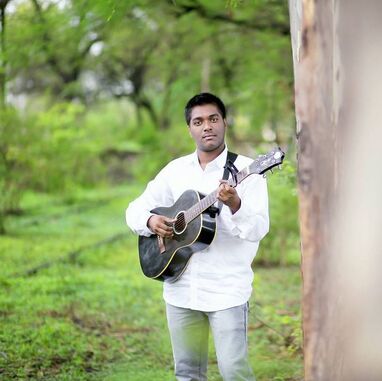
Hi, everyone, my name is Mujjo I am a Music composer, record producer, singer, and songwriter from east India. I remember when I got my first symptoms of VSS when I was suffering from typhoid in the year 2018.
It all started with static, floaters, flashes in my entire field of vision and slowly it got worsened!
I also suffered severe migraines. Once my typhoid medication got done my vision problems began to fade away, only mild static & floaters remained but flashes went away.
Fast forward to the 7th of November 2021, I had been diagnosed with typhoid again which was caused as the result of an increase in the amount of WBC, reduction in calcium, Tinnitus (a high-pitched ringing in my right ear 24/7). VSS flashes hit me back even stronger than before & I thought I am going to be blind permanently! I was feeling very anxious! This situation turned me into a very emotional person, every day I woke up with this static that would make me depressed! All I felt was as if I was watching my life on a Television set!
I am not able to see the sky clear as before in daytime. It is manageable, but the nights are problematic since the VSS flashes make it way too difficult to deal with it.
After an appointment with an eye doctor, I went through numerous eye check-ups. I came to know my eyes are 100% normal. Later I was diagnosed with VSS at first it was difficult for me to accept that there is no cure or medication for it but I started to think about the people who are blind at least I am not blind I just see the world from a different perspective & I accepted it as part of my life and moved forward. Trust me things got better! The people who are going through this silent disability it's important to know that you are not alone it's hard but once you accept and stop worrying about it & brain starts to tune it out, now I live my life normal like before, I cope with VSS and Tinnitus with help of early sleeping habits and proper diet and morning meditation, yoga, and stretching exercise and more water in-take and along with help of music. As a music artist, I have to work on a lot of music projects, so it keeps my mind busy at work and keeps me away from anxious thoughts so definitely music is the best healer!
A normal life with VSS is 100% possible I hope in the future a cure will be found stay strong!
It all started with static, floaters, flashes in my entire field of vision and slowly it got worsened!
I also suffered severe migraines. Once my typhoid medication got done my vision problems began to fade away, only mild static & floaters remained but flashes went away.
Fast forward to the 7th of November 2021, I had been diagnosed with typhoid again which was caused as the result of an increase in the amount of WBC, reduction in calcium, Tinnitus (a high-pitched ringing in my right ear 24/7). VSS flashes hit me back even stronger than before & I thought I am going to be blind permanently! I was feeling very anxious! This situation turned me into a very emotional person, every day I woke up with this static that would make me depressed! All I felt was as if I was watching my life on a Television set!
I am not able to see the sky clear as before in daytime. It is manageable, but the nights are problematic since the VSS flashes make it way too difficult to deal with it.
After an appointment with an eye doctor, I went through numerous eye check-ups. I came to know my eyes are 100% normal. Later I was diagnosed with VSS at first it was difficult for me to accept that there is no cure or medication for it but I started to think about the people who are blind at least I am not blind I just see the world from a different perspective & I accepted it as part of my life and moved forward. Trust me things got better! The people who are going through this silent disability it's important to know that you are not alone it's hard but once you accept and stop worrying about it & brain starts to tune it out, now I live my life normal like before, I cope with VSS and Tinnitus with help of early sleeping habits and proper diet and morning meditation, yoga, and stretching exercise and more water in-take and along with help of music. As a music artist, I have to work on a lot of music projects, so it keeps my mind busy at work and keeps me away from anxious thoughts so definitely music is the best healer!
A normal life with VSS is 100% possible I hope in the future a cure will be found stay strong!
Meet Liz
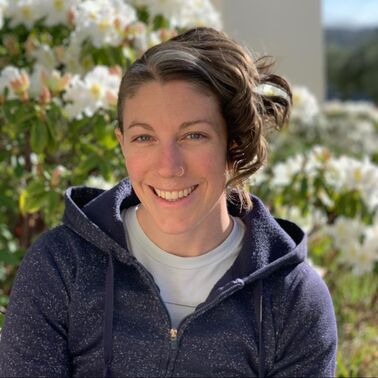
It is important to get to know the people and faces behind a disease. No two experiences are alike. Visual Snow Syndrome is on a spectrum from mild to severe cases. From people born with the condition to people who have a sudden onset. Here Liz Brent-Maldonado will tell you her story and journey with Visual Snow Syndrome.
I've had Visual Snow Syndrome my whole life. I remember talking to my mom about it when I was 8 or 9 and realizing that I was seeing things that no one else was seeing (constant sparkle static, extra glow and colors around everything, after images, trailing images, and stars-times-a-billion between the real stars in the night sky). She encouraged me to talk to our eye doctor about it, but he thought I was talking about floaters and dismissed it.
I always hoped it was a superpower I could harness, but instead spent a lot of my life ignoring it in order to just live normally. I never told anyone about it except the occasional significant other. I was always afraid that if I talked about it with doctors or scientists, I would be told I was losing my mind or I would end up locked up in a hospital or lab (I realize this is extreme, but I watched a lot of science fiction movies and tv shows!).
In 2015 I started writing a series of autobiographical essays and realized what a mystery my unique visual experience is and that I wanted to write more about that!
In 2016, I ran across the term "Tetrachromatic Vision" and thought that maybe that was what I had. That discovery inspired a long process of facing my fears, contacting scientists, and getting a new series of ophthalmology tests (which came back normal).
In 2018, I ran across the term Visual Snow Syndrome and realized that this was a better match for my experience. I'm currently writing a book about my investigative journey and living with what I still call my "sparkle vision."
But this year, I was able to share the Visual Snow diagnostic criteria with my primary care provider, which led to confirmation of my self-diagnosis by two neurologists!
I've overcome a lot of fear and doubt to be able to talk more openly to everyone from medical professionals to friends and family about my experience. My dream is to publish my book, help others who experience VSS, and bring awareness to neurodiversity.
I've had Visual Snow Syndrome my whole life. I remember talking to my mom about it when I was 8 or 9 and realizing that I was seeing things that no one else was seeing (constant sparkle static, extra glow and colors around everything, after images, trailing images, and stars-times-a-billion between the real stars in the night sky). She encouraged me to talk to our eye doctor about it, but he thought I was talking about floaters and dismissed it.
I always hoped it was a superpower I could harness, but instead spent a lot of my life ignoring it in order to just live normally. I never told anyone about it except the occasional significant other. I was always afraid that if I talked about it with doctors or scientists, I would be told I was losing my mind or I would end up locked up in a hospital or lab (I realize this is extreme, but I watched a lot of science fiction movies and tv shows!).
In 2015 I started writing a series of autobiographical essays and realized what a mystery my unique visual experience is and that I wanted to write more about that!
In 2016, I ran across the term "Tetrachromatic Vision" and thought that maybe that was what I had. That discovery inspired a long process of facing my fears, contacting scientists, and getting a new series of ophthalmology tests (which came back normal).
In 2018, I ran across the term Visual Snow Syndrome and realized that this was a better match for my experience. I'm currently writing a book about my investigative journey and living with what I still call my "sparkle vision."
But this year, I was able to share the Visual Snow diagnostic criteria with my primary care provider, which led to confirmation of my self-diagnosis by two neurologists!
I've overcome a lot of fear and doubt to be able to talk more openly to everyone from medical professionals to friends and family about my experience. My dream is to publish my book, help others who experience VSS, and bring awareness to neurodiversity.
Meet Angela
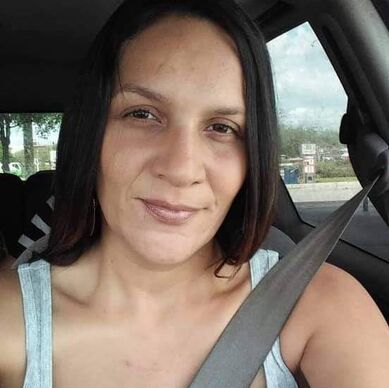
I want to introduce myself; I'm Angela Rivera and I have suffered from visual snow since November 26, 2018.
This is how it started with me.
I started to get ear pressure and head pressure. I went to doctors and got diagnosed with ETD (eustachian tube dysfunction). The pressure kept going on for about 2 weeks and I was so stressed, and my anxiety was so bad. Then I developed eye floaters and I started with daily migraines and visual snow symptoms started to show. I got so scared. I saw 4 eye doctors and neurologists - all said migraines. I was diagnosed with status migrainosus.
I stood with my symptoms for about 8 months and slowly they started to resolve. I was fine for a couple of years, until June 19, 2021. Then the ear pressure came back and so did my daily migraines and my visual snow symptoms.
Since June, I have daily migraine and visual snow. My daily life is always a battle to be able to watch my kids. I’m always in pain and these symptoms really get me down. I try my best to keep going with this condition. At times it's very hard on me. I pray that one day there's treatment for this because I can't see myself living like this the rest of my life.
This is how it started with me.
I started to get ear pressure and head pressure. I went to doctors and got diagnosed with ETD (eustachian tube dysfunction). The pressure kept going on for about 2 weeks and I was so stressed, and my anxiety was so bad. Then I developed eye floaters and I started with daily migraines and visual snow symptoms started to show. I got so scared. I saw 4 eye doctors and neurologists - all said migraines. I was diagnosed with status migrainosus.
I stood with my symptoms for about 8 months and slowly they started to resolve. I was fine for a couple of years, until June 19, 2021. Then the ear pressure came back and so did my daily migraines and my visual snow symptoms.
Since June, I have daily migraine and visual snow. My daily life is always a battle to be able to watch my kids. I’m always in pain and these symptoms really get me down. I try my best to keep going with this condition. At times it's very hard on me. I pray that one day there's treatment for this because I can't see myself living like this the rest of my life.

